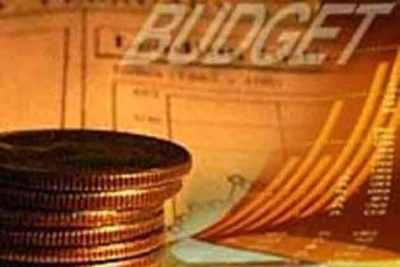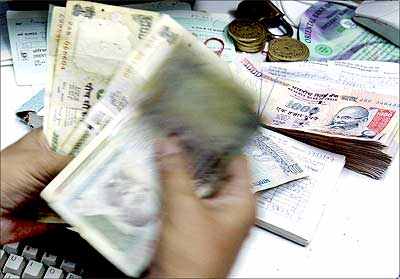Vrishti Beniwal, Indivjal Dhasmana
The markets tanked 209 points after Finance Minister Pranab Mukherjee tabled the Union Budget in Parliament on Friday. Economic Affairs Secretary R Gopalan defends the measures, saying the markets will need time to comprehend the measures.
The markets have not reacted very positively to the Budget. Are they missing something?
There could be 100 reasons why the markets are a little apprehensive. The markets will take time to understand the full implication of the Budget.
The marginal reduction in the Securities Transaction Tax (STT) rate has failed to impress the markets. Should the reduction have been steeper?
We want to directionally change the behaviour of people. The cash section is far less than options and futures. There are different views about STT. If we don't tax them, you write about fiscal deficit. We need to recognise that cash transactions have to be made more comfortable for people.
Union Budget 2012-13: Complete coverage...
Markets need time to understand the full implications: R Gopalan
The market borrowing target for next year is on a higher side. Wouldn't that crowd out private investment?
This year, it will be Rs 4.36 lakh crore. We have budgeted for Rs 4.79 lakh crore in 2012-13, additional borrowing of a little over Rs 40,000 crore. It's not necessary that we need to borrow the entire money next year.
The borrowing is slightly on the higher side but we will be reducing this. I have a feeling that if we choose not to keep a higher cash balance towards the end of the year, we can do with less borrowing.
...
Markets need time to understand the full implications: R Gopalan
This year, you had to go for 20 per cent extra market borrowing as compared to the Budget estimates, due to fewer funds in small savings. Do you think the drop in small savings will get arrested next year, which will lead to less borrowing?
That is people's choice. Small savings affect the composition of our borrowings. These would be less because we may not require that much cash. There is a need to reduce it drastically as we go along. If the tax to GDP ratio goes up, borrowing can go down.
The fiscal deficit has increased to 5.9 per cent of GDP this financial year and is projected at 5.1 per cent next year. Doesn't a fiscal deficit above five per cent give a wrong signal to foreign investors?
Foreign investors look at a number of reasons before investing in a country. They look at macro economic stability, availability of skilled persons and growth. If growth is there, the ability to repay will be far more. The fiscal deficit is just one factor in macro economic stability.
Union Budget 2012-13: Complete coverage...
Markets need time to understand the full implications: R Gopalan
You talked about stability in policy. In that sense, changes in the law to bring transactions like Vodafone under the tax net and from a retrospective effect at that, also affect investors' confidence.
The intent of the government has been in the books for years. And, as I said, foreign investors look at a variety of factors like how easy it is to do business in India, the availability of credit and so on.
After the cancellation of 122 telecom licences by the Supreme Court, some foreign operators are considering action under bilateral investment promotion and protection agreements. Shouldn't the government clear the confusion and send a clear message that their interests are protected?
Whatever you do, the law of the land prevails. This is not a problem for only foreign companies. Indian companies were also affected. So, why create a favourable situation only for foreign investors?
Union Budget 2012-13: Complete coverage...
Markets need time to understand the full implications: R Gopalan
Within the finance ministry, too, there is a concern about higher external commercial borrowing. A depreciating rupee would increase the cost of burden on companies in rupee terms. Also, if companies like Kingfisher are not able to raise money in India, why would anyone lend them from abroad?
Exchange rates have moved up. We are hopeful airlines and others will be able to raise funds. If the results are not good, some mid-course correction will be required. We can always take corrective steps.
Union Budget 2012-13: Complete coverage...
Markets need time to understand the full implications: R Gopalan
The Budget allowed qualified foreign investors to invest in the corporate bond market, but a lot remains to be done. Would you take more steps in this direction during the course of the year?
Corporate bonds we have been easing over a period of time. That is the future area for attention and care. We should also see how much external debt we can take. We cannot be a highly externally debt-ridden country. Still, there are problems in mark-to-market, slotting, trading, total lock-in period.
The other factors are much more serious, in my view. Our problem is that our banks are reaching their limits on infrastructure exposure. So, where do we get the money from? My personal view is that there is a lot to do on the corporate bond market and we will do that.
Union Budget 2012-13: Complete coverage...
Markets need time to understand the full implications: R Gopalan
In the Budget, you doubled the amount for tax-free infrastructure bonds. Are you confident all this amount will be raised? Ports did not come with an issue last year.
The demand came from the Jawaharlal Nehru Port Trust (to raise Rs 5,000 crore) but the issue did not come last year because people were making a choice. People will shift now.
Don't you think raising service tax and central excise would be inflationary?
Increases in tax rates have a dual effect -- one on the fiscal deficit and another on inflation. If we don't increase taxes, the fiscal deficit will go up. That also leads to increase in inflation in the long run. The ideal thing is to pass on the prices in a non-disruptive way.
Union Budget 2012-13: Complete coverage








article